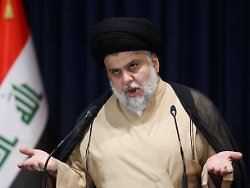Tuesday, October 12, 2021
Opponents of foreign interference
Preacher al-Sadr wins Iraq elections
Iraq remains under the leadership of the Shiite majority: the cleric al-Sadr wins the early elections by a clear margin. The preacher resists any foreign intervention. Voter turnout is low because of disappointment with the political elite.
In Iraq, the party of the Shiite cleric Moktada al-Sadr won the parliamentary elections by a clear margin, according to official figures. According to initial counts, his party has won more than 70 seats. The Shiite majority in the Iraqi population has provided or dominated all governments since the US-led invasion in 2003. Sunday’s elections were brought forward after mass protests in 2019 overthrew the then government and widespread anger against top politicians became evident. Many are accused of getting rich at the expense of the country.
Observers do not expect conditions in Iraq to change fundamentally as a result of the election result. After the first counting results, Sadr has a dominant role again. The populist preacher has often been the kingmaker in Iraqi politics in the past. He has spoken out against any foreign intervention, including Iran, but regularly visits the neighboring country. Since 2003, parliamentary elections have been followed by difficult negotiations to form a government, which can drag on for months.
Low voter turnout due to disappointment
According to the interim results, the coalition of the Sunni parliamentary president Mohammed al-Halbusi’s Takaddum can send 38 members, followed by the former Shiite head of government Nuri al-Maliki with 37 seats in the 329-seat parliament. Compared to the last parliamentary election in 2018, parties with ties to Iran and militias suffered losses this time. In contrast, reform parties that arose after the protests were able to win some seats from scratch.
Many Iraqis stayed away from the election because they were disappointed with the political elite. They do not believe that the democratic system introduced after the US invasion works. In the 2018 election, only 44.5 percent had cast their vote.
Prime Minister Mustafa al-Kadhimi had brought the vote several months forward on Sunday after the mass demonstrations for more jobs and better living conditions. The rallies, some of which were violently suppressed, were directed against the ruling elite. In response to the protests, a new electoral law was passed designed to give independent and reform-minded candidates better opportunities. In total, more than 160 parties and over 3200 candidates applied for entry into parliament.
